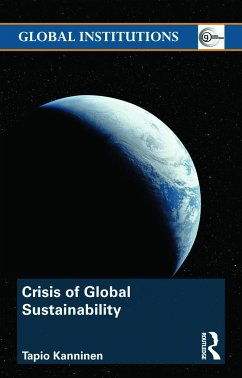This concise and informative text provides a critical history of the concept of sustainability and the various institutional measures taken to promote, implement and enforce sustainable development, proposing new organizational solutions to deal with the crisis of sustainability.
Crisis of Global Sustainability provides for the first time a compact insider description of the evolution and impact of the Club of Rome, a global think tank that produced a groundbreaking 1972 study "The Limits to Growth" which highlighted the dangers of unrestrained economic growth and possible collapse of global economy during the first decades of the 21st century. With recent research confirming the validity of these concerns, Kanninen asks whether our overarching concept of thinking on world development today should continue to be "global sustainability", which implies that we still have enough time to make adjustments in our future policies and action. Or should the main paradigm of ourthinking shift to "global survivability", a concept that stresses the absolute necessity of immediate and drastic change both in institutions and policies?
Many environmentalists, green politicians and think tanks are speaking today more loudly than ever about the necessity for a major policy, institutional and paradigm change and this work is essential reading for students and scholars alike.
Crisis of Global Sustainability provides for the first time a compact insider description of the evolution and impact of the Club of Rome, a global think tank that produced a groundbreaking 1972 study "The Limits to Growth" which highlighted the dangers of unrestrained economic growth and possible collapse of global economy during the first decades of the 21st century. With recent research confirming the validity of these concerns, Kanninen asks whether our overarching concept of thinking on world development today should continue to be "global sustainability", which implies that we still have enough time to make adjustments in our future policies and action. Or should the main paradigm of ourthinking shift to "global survivability", a concept that stresses the absolute necessity of immediate and drastic change both in institutions and policies?
Many environmentalists, green politicians and think tanks are speaking today more loudly than ever about the necessity for a major policy, institutional and paradigm change and this work is essential reading for students and scholars alike.
"The book is scholarly in its depth of analysis, yet manages to be approachable for a general audience. Because of its emphasis on developing policy solutions, it is best suited to policy makers, scholars, and students.Kanninen uses pertinent examples and case studies to illustrate past failings in how individuals and institutions have responded to dire warnings about the Earth's future. For example, he illustrates how the scientific community may criticize - and reject-innovative solutions or approaches to problems because they run counter to accepted beliefs or methodologies." - Miriam Aczel, Imperial College London, ACUNS
"The book is scholarly in its depth of analysis, yet manages to be approachable for a general audience. Because of its emphasis on developing policy solutions, it is best suited to policy makers, scholars, and students.Kanninen uses pertinent examples and case studies to illustrate past failings in how individuals and institutions have responded to dire warnings about the Earth's future. For example, he illustrates how the scientific community may criticize - and reject-innovative solutions or approaches to problems because they run counter to accepted beliefs or methodologies." - Miriam Aczel, Imperial College London, ACUNS








